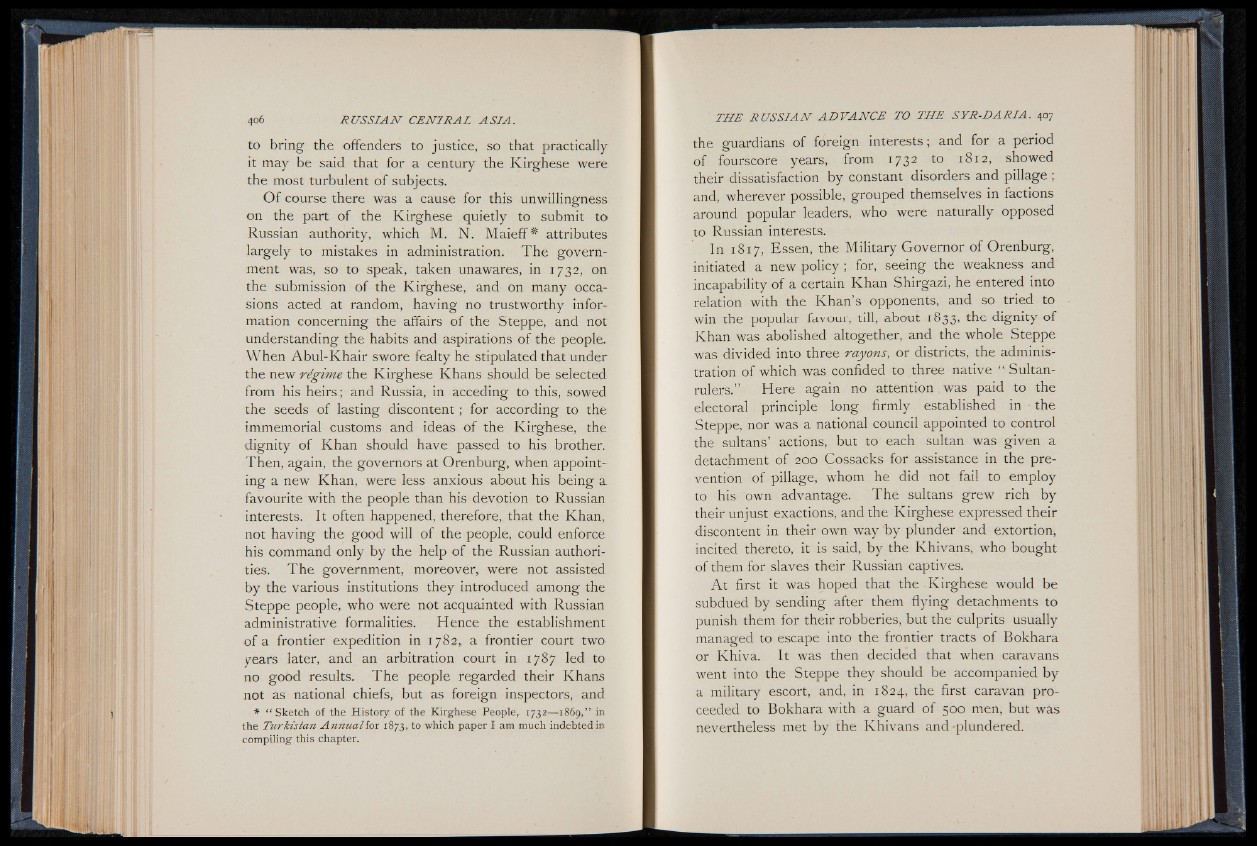
to bring the offenders to justice, so that practically
it may be said that for a century the Kirghese were
the most turbulent of subjects.
O f course there was a cause for this unwillingness
on the part of the Kirghese quietly to submit to
Russian authority, which M. N. Maieff * attributes
largely to mistakes in administration. The government
was, so to speak, taken unawares, in 1732, on
the submission of the Kirghese, and on many occasions
acted at random, having no trustworthy information
concerning the affairs of the Steppe, and not
understanding the habits and aspirations of the people.
When Abul-Khair swore fealty he stipulated that under
the new régime the Kirghese Khans should be selected
from his heirs; and Russia, in acceding to this, sowed
the seeds of lasting discontent ; for according to the
immemorial customs and ideas of the Kirghese, the
dignity of Khan should have passed to his brother.
Then, again, the governors at Orenburg, when appointing
a new Khan, were less anxious about his being a
favourite with the people than his devotion to Russian
interests. It often happened, therefore,, that the Khan,
not having the good will of the people, could enforce
his command only by the help of the Russian authorities.
The government, moreover,, were not assisted
by the various institutions they introduced among the
Steppe people, who were not acquainted with Russian
administrative formalities. Hence the establishment
of a frontier expedition in 1782, a frontier court two
years later, and an arbitration court in 1787 led to
no good results. The people regarded their Khans
not as national chiefs, but as foreign inspectors, and
* “ Sketch of the History of the Kirghese People, 1732— 1869,” in.
the Turkistan Annualiox 1873, to which paper I am much indebted in
compiling this chapter.
the guardians of foreign interests; and for a period
of fourscore years, from 1732 to 1812, showed
their dissatisfaction by constant disorders and pillage ;
and, wherever possible, grouped themselves in factions
around popular leaders, who were naturally opposed
to Russian interests.
In 1817, Essen, the Military Governor of Orenburg,
initiated a new policy ; for, seeing the weakness and
incapability of a certain Khan Shirgazi, he entered into
relation with the Khan’s opponents, and so tried to
win the popular favour, till, about 1833, the dignity of
Khan was abolished altogether, and the whole Steppe
was divided into three rayons, or districts, the administration
of which was confided to three native “ Sultan-
rulers.” Here again no attention was paid to the
electoral principle long firmly established in the
Steppe, nor was a national council appointed to control
the sultans’ actions, but to each sultan was given a
detachment of 200 Cossacks for assistance in the prevention
of pillage, whom he did not fail to employ
to his own advantage. The sultans grew rich by
their unjust exactions, and the Kirghese expressed their
discontent in their own way by plunder and extortion,
incited thereto, it is said, by the Khivans, who bought
of them for slaves their Russian captives.
A t first it was hoped that the Kirghese would be
subdued by sending after them flying detachments to
punish them for their robberies, but the culprits usually
managed to escape into the frontier tracts of Bokhara
or Khiva. It was then decided that when caravans
went into the Steppe they should be accompanied by
a military escort, and, in 1824, the first caravan proceeded
to Bokhara with a guard of 500 men, but was
nevertheless met by the Khivans and-plundered.